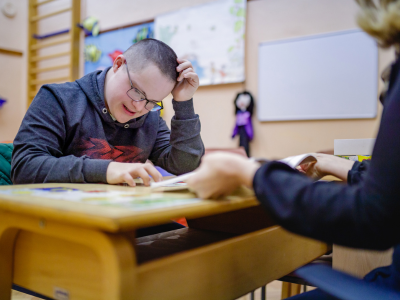Quarterly Updates from DRC - September 2024
Navigating Bullying with the Help of the Disability & Aging Crime Victims Unit (DACVU)
"We COULD NOT have gone through this school mess with our son without DRC's help. Our son was getting bullied/hit at middle school. He is non-verbal and incontinent. The school moved him to a spot with no camera view and they were not going to add cameras. We didn't know what we could or couldn't do—we didn't know our rights. They didn't make changes until we got DRC involved. The help was invaluable. Very grateful!" -Stephanie, Parent
Both DRC and DRC's Disability & Aging Crime Victims Unit (DACVU) can help with special education and bullying issues. We are here to help. If you have questions about your rights or need assistance with a bullying situation, contact us.
New Resource: Students with Disabilities & Bulling
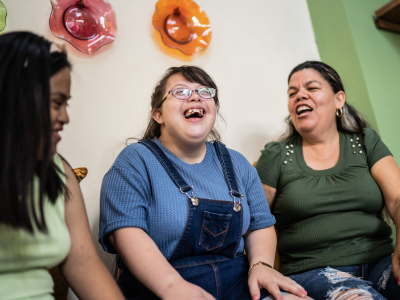
Do you have a child with a disability who is being bullied in school?
Children with an IEP (Individualized Education Program) or 504 Plan are entitled to certain rights. For example, children with an IEP are entitled to a Free Appropriate Public Education (FAPE) in the Least Restrictive Environment (LRE), but bullying can interfere with their education. Children with disabilities rights under an IEP or 504 Plan can offer assistance with getting bullying issues addressed. DRC has a new brochure with information about bullying including steps to take to stop or prevent bullying, what to do if bullying continues to occur after taking those steps, and accommodations you can request to prevent bullying.
Students with Disabilities & Bullying Brochure
A Guide for Kansas Parents & Students
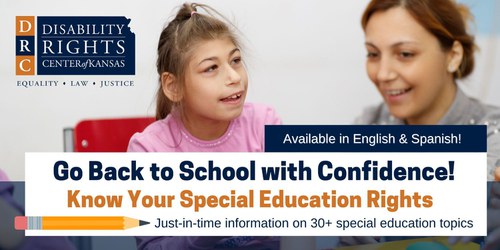
We know parents of students with disabilities are busier than ever this time of year, getting back in the swing of things for back-to-school. This resource was made with busy parents like you in mind! Created by experts at DRC and Families Together, the Know Your Special Education Rights guide is a series of fliers, covering most everything a parent or student needs to know about Special Education. The guide is compiled of brief fliers (one-page, front and back) and written in plain language. That way, you can quickly and easily get the facts you need “just-in-time” to effectively advocate for your child.
Here are a few of the 30+ helpful "just-in-time" fliers for the start of the school year:
1. What is an Individualized Education Program (IEP)?
2. Who can make a referral for an evaluation to determine if my child needs Special Education services?
3. How can I advocate for my child at an IEP meeting?
4. What is a Functional Behavioral Assessment (FBA) and a Behavioral Intervention Plan (BIP)?
5. What is Child Find?
View the Full Guide
Ver la Guía Completa En Español
Americans with Disabilities Act (ADA) 34th Anniversary

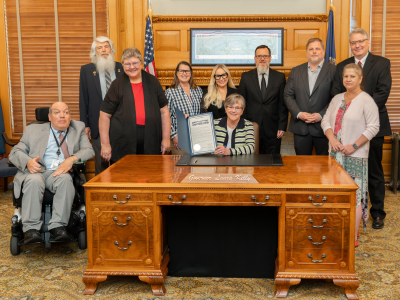
On July 26th, 2024, we celebrated the 34th Anniversary of the Americans with Disabilities Act (ADA)! DRC proudly joined Governor Laura Kelly for the ADA Proclamation signing.
The ADA remains one of the most significant civil rights laws, ensuring equal rights and opportunities for individuals with disabilities in every aspect of public life—jobs, schools, transportation, and all public and private spaces that are open to the public. The ADA's purpose is simple yet powerful: to guarantee that people with disabilities have the same rights and opportunities as everyone else.
Read the full Proclamation by the Governor here
Video: What Are the Rules for Service Animals?
Meet Mia Ives-Rublee and her trusty companion, Zini! ![]() Service animals like Zini play a vital role in the daily lives of people with disabilities, helping with tasks to live independently.
Service animals like Zini play a vital role in the daily lives of people with disabilities, helping with tasks to live independently.
What are the rules for service animals? How should you act around them? Watch the video to find out!
If you have questions or concerns about your disability rights and service animals in Kansas, contact us!
Disability Employment Assistance
Through the Client Assistance Program (CAP), DRC helps Kansans with disabilities seeking or keeping a job better access and obtain Vocational Rehabilitation services. DRC’s CAP program can help you make informed choices throughout the Vocational Rehabilitation and Independent Living process. Learn more about the CAP in our flyer here.
Assistance in the Voting Booth
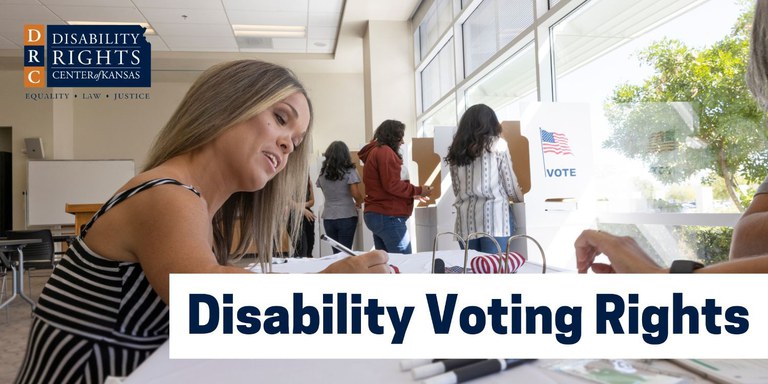
Election season is upon us! It's time to check our voter registration, make a plan, and freshen up on our rights, including our rights in the voting booth!
Federal law gives voters with disabilities the right to decide whether to get assistance in casting a ballot and who will provide it.
Who can you ask?
You can ask a friend, family member, caregiver, assisted living provider, facility staff person, or almost anyone else. You can also ask a poll worker.
Your assistant CAN help:
1. Read the ballot.
2. Fill in the bubbles or make selections on the screen.
3. Explain the ballot in a way that makes sense to you.
Your assistant CANNOT:
1. Make decisions for you.
2. Make you feel forced to vote a certain way.
3. Keep information from you.
4. Give you false information.
5. Share how you voted with anyone.
After completing your ballot, your assistant should go through the ballot and make sure you are happy with the selections.
Your Vote is Your Voice! Use it!
The 2024 General Election will be here before we know it. Take note of some important deadlines and be sure you are registered to vote.
October 15: Deadline to register to vote or update your voter registration info
October 29: Last day to apply for an advance voting mail ballot
November 5: GENERAL ELECTION (All advance ballots by mail must be postmarked by Election Day and received by November 8)
Register to vote now at: ksvotes.org
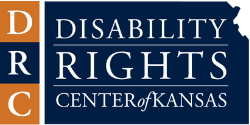.png)







